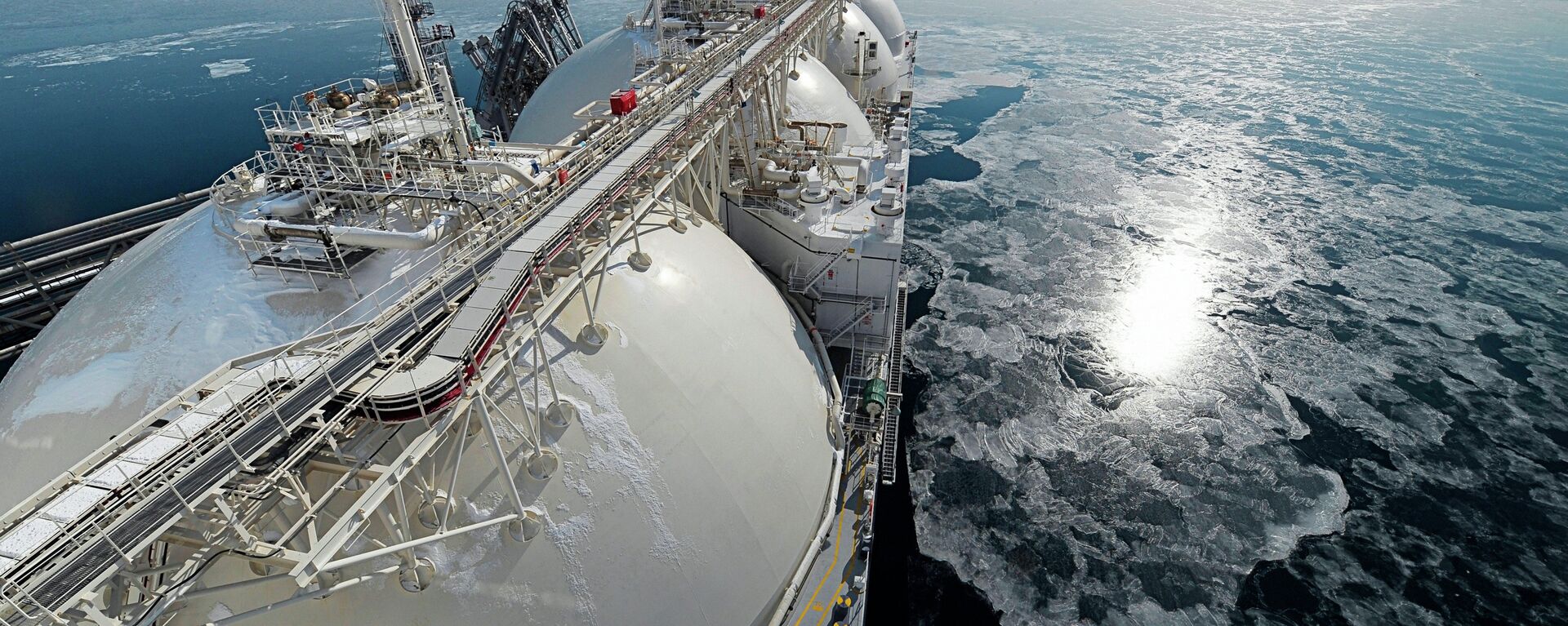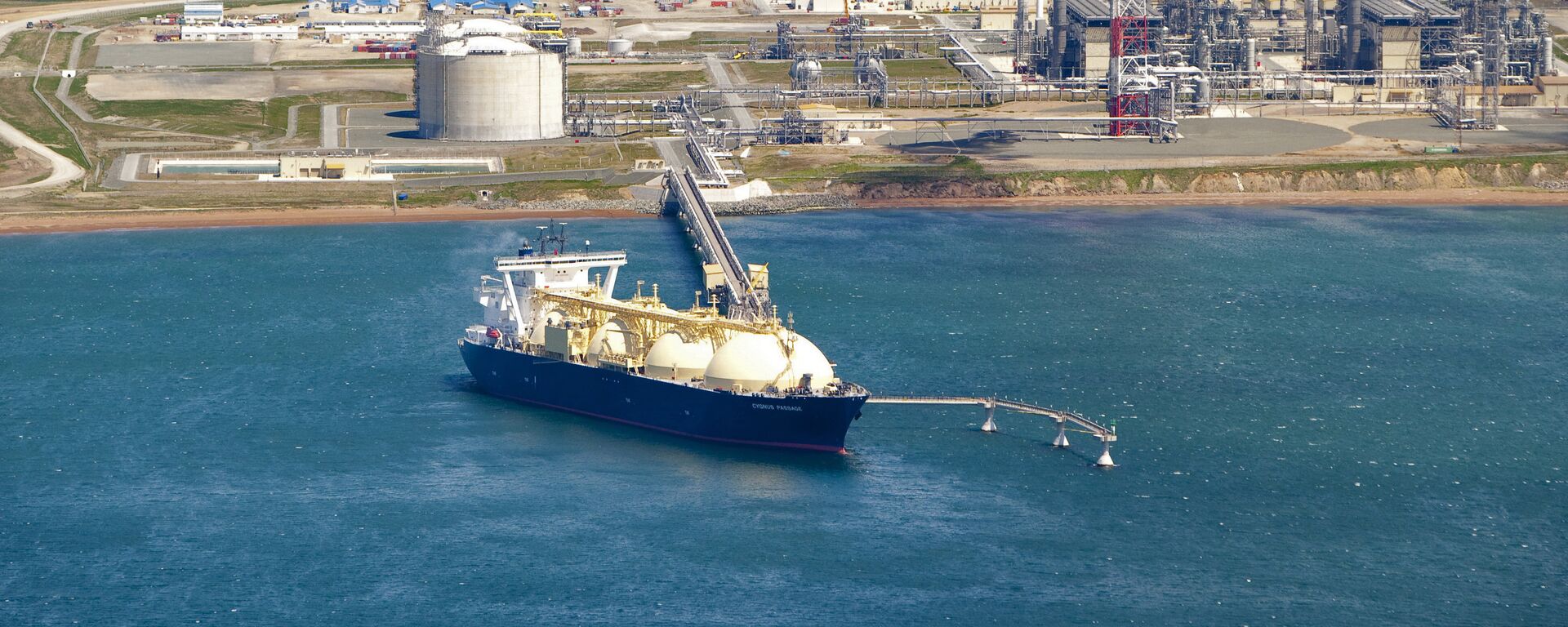https://sputnikglobe.com/20230816/europes-self-imposed-sky-high-lng-prices-putting-lights-off-in-poorer-nations-1112647400.html
Europe’s Self-Imposed Sky-High LNG Prices ‘Putting Lights Off’ in Poorer Nations
Europe’s Self-Imposed Sky-High LNG Prices ‘Putting Lights Off’ in Poorer Nations
Sputnik International
An industry expert told Sputnik on Wednesday that Europe’s strategy for pressuring Russia with an energy boycott was causing chaos around the globe, driving gas prices higher and depriving poorer nations of much-needed fuel.
2023-08-16T17:19+0000
2023-08-16T17:19+0000
2023-08-16T17:38+0000
analysis
liquefied natural gas (lng)
chevron
thierry bros
european union (eu)
prices
boycott
https://cdn1.img.sputnikglobe.com/img/07e6/01/1a/1092527755_0:82:2917:1723_1920x0_80_0_0_54fc667f84bedbde43b4b50e1ea706ae.jpg
Renewed talk of a strike at Australia’s largest liquefied natural gas (LNG) production facility has triggered a sharp spike in LNG prices, including a whopping 40% rise on the European market.It’s unclear if Woodside employees at the North West Shelf liquefaction facility, Australia’s largest, or Chevron employees at the nearby Gorgon facility, the country’s second-largest LNG operation, will strike, even though a strike has been authorized. However, Europe’s self-imposed LNG shortage, caused by its boycott of Russian energy exports, has driven prices sky-high and put such pressure on markets around the world that the mere threat of a supply disruption on the other side of the planet has destabilized markets.Thierry Bros, professor at the Paris Institute of Political Studies and a contributor to the independent specialized website Natural Gas World, told Sputnik that while European governments will be inconvenienced by the higher prices, the greatest sufferers will be developing nations who are priced out by European buyers.“So I think the narrative is slightly shifting away, but unfortunately some people still believe that oil and gas is evil. And so, if we do not invest, there is less competition in the market. Let me phrase this very clearly: if TotalEnergies, Shell, BP - i.e. what we call international oil companies - invests less in oil and gas, let's take oil in this case, then if Saudi Arabia or Russia want to reduce their own production, there is no spare capacity available. We cannot provide those extra volumes. And so the price needs to go up,” he explained.“So that's how the commodity works. And if you do not understand how commodities work, you're not going to solve the problem. You need to be able to understand it and you need to be able to say, ‘Well, what the IEA recommended in 2021,’ which was, I remind you, no new investment in oil and gas, ‘was wrong.’ And so therefore, we need to invest, we need to invest in a way to make it acceptable for the climate. So we need to invest in a way to try to push coal out. But if we do not do this, then we are going to see what we are seeing right now: an energy crisis, oil and coal at record levels in terms of demand, which is very bad for the environment.”Bros explained that gas prices are mostly regional, and while Europe itself might receive only a tiny amount of the gas produced in Australia, its hunger for gas in closer markets nonetheless puts pressure on those far away, too.“It's going to cost us a lot. And then there is the question of the sustainability of our own budget. But I think it's a question for poorer countries and poorer countries are looking at us and are not going to trust us in the long run. Because we failed in our energy transition - and Germany being, I think, the best example of failure - we cannot lecture poorer countries on how to do this, first of all. Secondly, those countries know that if there is a problem, we will increase prices to be able to reroute the LNG away from their hands. So they have to not only think by themselves, but find solutions that are resilient without us interfering. And unfortunately this is more coal. I think, because we failed on the transition, or because Germany failed its energy transition, we are pushing some other countries back to coal, which is horrible in terms of climate.”“It's interesting to me that the wake-up call is coming in plain summer at a time where our storage is full and we are only talking about potential strikes and you see this massive increase in prices. I think it is a testimony that the energy crisis is still ongoing in Europe.”“The ones who benefit from the overall situation are what we call the portfolio players, i.e. big integrated international oil companies - and in particular Shell and TotalEnergies, number one and number two - that are going to make profitable arbitrage. And the ones that are going to lose are less well-off countries and our European budget that will have to provide subsidies. So indirectly we are providing our European neighbors subsidies for the IOC to be more profitable. I leave you to think about the moral of this.”
https://sputnikglobe.com/20230722/second-to-none-arctic-lng-2-to-boost-russias-share-in-world-energy-market-1112063345.html
https://sputnikglobe.com/20230630/tokyo-exempts-sakhalin-projects-arctic-lng-2-from-ban-on-providing-services-to-russia-1111567178.html
Sputnik International
feedback@sputniknews.com
+74956456601
MIA „Rosiya Segodnya“
2023
News
en_EN
Sputnik International
feedback@sputniknews.com
+74956456601
MIA „Rosiya Segodnya“
Sputnik International
feedback@sputniknews.com
+74956456601
MIA „Rosiya Segodnya“
lng; australia; gorgon gas; wheatstone; lng prices
lng; australia; gorgon gas; wheatstone; lng prices
Europe’s Self-Imposed Sky-High LNG Prices ‘Putting Lights Off’ in Poorer Nations
17:19 GMT 16.08.2023 (Updated: 17:38 GMT 16.08.2023) An industry expert told Sputnik on Wednesday that Europe’s strategy for pressuring Russia with an energy boycott was causing chaos around the globe, driving gas prices higher and depriving poorer nations of much-needed fuel.
Renewed talk of a strike at Australia’s largest liquefied natural gas (LNG) production facility has triggered a sharp spike in LNG prices, including a whopping 40% rise on the European market.
It’s unclear if Woodside employees at the North West Shelf liquefaction facility, Australia’s largest, or Chevron employees at the nearby Gorgon facility, the country’s second-largest LNG operation, will strike, even though a strike has been authorized. However, Europe’s self-imposed LNG shortage, caused by its boycott of Russian energy exports, has driven prices sky-high and put such pressure on markets around the world that the mere threat of a supply disruption on the other side of the planet has destabilized markets.
Thierry Bros, professor at the Paris Institute of Political Studies and a contributor to the independent specialized website Natural Gas World, told Sputnik that while European governments will be inconvenienced by the higher prices, the greatest sufferers will be developing nations who are priced out by European buyers.
“We shouldn't be complacent. The crisis is ongoing and we've put €800 billion in subsidies to help our people and industry last year alone,” he said of the European Union’s efforts. “We haven't so far signed new long-term contracts in a massive way. So what we are facing is the fact that because of the IEA [International Energy Association] net-zero scenario in 2021, we've viewed oil and gas as bad, which is why we are in this situation. And so we need this to change. It's changing slightly. I mean, you've seen US President Biden asking the oil industry in the US to produce more oil. You've seen Norway in the beginning of this year, launching a new concession in the Arctic. You've seen two weeks ago, the UK was going to offer new oil and gas concessions.”
“So I think the narrative is slightly shifting away, but unfortunately some people still believe that oil and gas is evil. And so, if we do not invest, there is less competition in the market. Let me phrase this very clearly: if TotalEnergies, Shell, BP - i.e. what we call international oil companies - invests less in oil and gas, let's take oil in this case, then if Saudi Arabia or Russia want to reduce their own production, there is no spare capacity available. We cannot provide those extra volumes. And so the price needs to go up,” he explained.
“So that's how the commodity works. And if you do not understand how commodities work, you're not going to solve the problem. You need to be able to understand it and you need to be able to say, ‘Well, what the IEA recommended in 2021,’ which was, I remind you, no new investment in oil and gas, ‘was wrong.’ And so therefore, we need to invest, we need to invest in a way to make it acceptable for the climate. So we need to invest in a way to try to push coal out. But if we do not do this, then we are going to see what we are seeing right now: an energy crisis, oil and coal at record levels in terms of demand, which is very bad for the environment.”
Bros explained that gas prices are mostly regional, and while Europe itself might receive only a tiny amount of the gas produced in Australia, its hunger for gas in closer markets nonetheless puts pressure on those far away, too.
“On the pricing level, we need to attract all those cargoes. What's happening here is we've increased prices to be sure that we are going to continue to attract cargos from the rest of the world. And last year we managed to keep the lights on, but we did this by rerouting LNG cargo [using] extremely high prices. And by putting the lights off in poorer countries, in Bangladesh, in Pakistan, and possibly in India, because we've taken the LNG away from their hands into our hands.”
“It's going to cost us a lot. And then there is the question of the sustainability of our own budget. But I think it's a question for poorer countries and poorer countries are looking at us and are not going to trust us in the long run. Because we failed in our energy transition - and Germany being, I think, the best example of failure - we cannot lecture poorer countries on how to do this, first of all. Secondly, those countries know that if there is a problem, we will increase prices to be able to reroute the LNG away from their hands. So they have to not only think by themselves, but find solutions that are resilient without us interfering. And unfortunately this is more coal. I think, because we failed on the transition, or because Germany failed its energy transition, we are pushing some other countries back to coal, which is horrible in terms of climate.”
“We managed last winter to keep our lights on in Europe because we had the warm winter, but we managed again so far to refill our storage in Europe to 90% full because there was plenty of LNG available and we've managed to reduce demand in Europe. But we need all the supply that's available - be it in gas, be it in oil. And so what this is showing us is the fact that the market is extremely worried. And that's a wake-up call,” Bros said.
“It's interesting to me that the wake-up call is coming in plain summer at a time where our storage is full and we are only talking about potential strikes and you see this massive increase in prices. I think it is a testimony that the energy crisis is still ongoing in Europe.”
“The ones who benefit from the overall situation are what we call the portfolio players, i.e. big integrated international oil companies - and in particular Shell and TotalEnergies, number one and number two - that are going to make profitable arbitrage. And the ones that are going to lose are less well-off countries and our European budget that will have to provide subsidies. So indirectly we are providing our European neighbors subsidies for the IOC to be more profitable. I leave you to think about the moral of this.”






